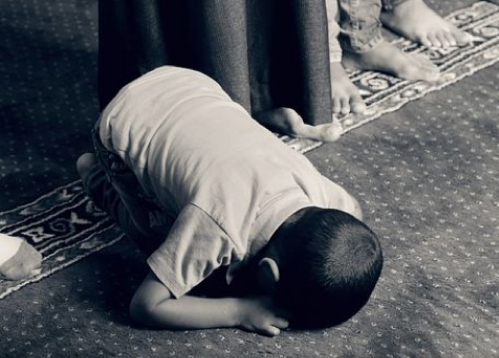A Guide on How to Engage with Friends and Family Who Aren’t Muslim
Are you struggling with how to handle the holidays? You are certainly not alone.
Not everyone may know that I wasn’t always Muslim. Well, of course, we are born that way, but I sure wasn’t raised to be. I didn’t even know what a Muslim was until I was nineteen years old. Yes…where I lived I never saw a Muslim or heard of one. This was pre-9/11, so Muslims weren’t spoken of or seen where I lived at the time.
If anyone knows how hard it is to manage emotions and relationships with family and friends who are not Muslim, it’s me. It’s been a life journey.

I think the hardest time seems to be November to January, when all of the winter holidays pop up, and when we are invited to parties and events of those we are closest to. Some of the holidays are even nostalgic for us, so we feel torn. We have these childhood feelings and memories, and yet a new way of living and a new perspective. The transition can feel painful and lonely at times.

Balancing our beliefs with our emotions and relationships can be hard. Many women have confided in me, even cried on my shoulder, about how they are struggling with friends and family who “just don’t understand.”
How bad can it get?

When I say I can relate, I really mean it. How much do I mean it? At the beginning and half way through I have had family and friends tell me I’m a traitor, not a good daughter, not a good sister, not a good friend and even had my family attempt to have my children legally taken from me, all because of my Islamic beliefs. Yes, it even went to the legal level. It was really hard…really hard.
You see when people don’t understand something they tend to fear it. What makes it worse is when the news and the internet only add fuel to the fire highlighting negative images and stories about Muslims.
It’s hard not to take things personally. Often, they just love us and want the best for us. They are afraid for us and our new-found faith. They make harsh comments and judgments that they don’t think are harsh and can make us feel like we are doing something wrong just by having our own opinion about how we see God and faith.
Does it get better?
Even though I have been through all that I have, I’m so grateful that I did.
I’m grateful that I was tested and I’m grateful that I refused to compromise my beliefs while still be kind to those who didn’t agree with me. It taught me so much, it built my character and better yet, it strengthened the relationships I now have with those same people.
Yes, we are all still friends and family and now have an even stronger relationship where everyone’s beliefs are respected and preserved. I hit the light at the end of the end of the tunnel, and Allah SWA has rewarded me with the peace I have been seeking with the people that I love.

How to Cope?
I have a couple of tips that I will share here but encourage all of you to look out for my e-book on managing relationships with families who don’t share the same faith. I will be sharing soon. It will have a great more deal of information and in-depth advice on how to navigate relationships and turmoil with family and friends who may not share the same religion as you do.
In the meantime,
- Don’t over compromise your beliefs.
- Don’t feel guilty that you are Muslim or love Islam.
- Know things will get better.
- Know hardships are only for a time.
Need more specific support?
See these suggestions:

-
Be proud of your belief enough to be yourself ALL OF THE TIME, not just depending on who you are with
This can be one of the toughest ones, but I’m starting with it first. Why? Because if you can master this one you can pretty much master them all.
Your biggest struggle isn’t them, it’s you.
I learned this late in the game. Life would have been soooo much easier had I realized much earlier.
When you aren’t like everyone else it is easy to feel awkward, like something is wrong with you. Like maybe they are right you should take your hijab off or just drink a little. Why am I struggling when I could just do whatever I want?
Wrong… don’t even start going there.
That will lead you to places you don’t want to end up, I promise. I have tons of horror stories that I could share about other sisters who went that route, only to lose more than Islam, they lost themselves.
Be proud of your belief. If you aren’t proud maybe it is because you haven’t truly learned about or begun to realize how beautiful Islam is. Maybe you have only been around Muslims who don’t really practice. That’s ok. Our beliefs don’t begin and end with how well others practice. If we haven’t learned, we can always begin searching. It’s never too late to start.
Where is the first place to go for answers on learning more about Islam?

* In sujood (in prostration on the ground).
Really? Not Google? I was thinking Sheikh Google for sure. No, and here’s why. When you are in sujood the believer is closest to his Lord. Who wouldn’t want that?
There are some things that only Allah SWA can solve for us. We say we trust Him, but we look for answers on the internet and in our friends first and Him last. Subhanallah, let’s better trust the one who created us. He knows what we need and how to fix us.
Once you are in sujood, beg for guidance and answers sincerely. After that, you leave your trust to Allah SWA. He is the best keeper of promises and always answers EVERY dua.
The Qur’an assures us:
“And when My slaves ask you (O Mohammed (SAW) concerning Me, then (answer them), I am indeed near (to them by My Knowledge). I respond to the invocations of the supplicant when he calls on Me (without any mediator or intercessor). So, let them obey Me and believe in Me, so that they may be led aright”
[Surah Al-Baqarah, 2:186]
* Next, keep your eyes, ears and mind open.
Allah SWA has sent me answers in the form of friends, articles, accidents and more. None of them were bad, all the best things that ever happened to me. They also answered my cry for help and questions. No kidding…every time. Subhanallah.
*Seek knowledge. Read (Iqrah).
Read trusted sources and sit in circles of knowledge. Call your local mosque or seek courses online. Be proactive about your faith.
You can’t be firm in what you believe if you don’t truly understand what you believe.
Shaytan, will also make you long for old traditions that you no longer know benefit by making you doubt your Islam all together. It’s not by chance.

2. Surround yourself with practicing Muslim friends
What in the world does this have to do with managing non-Muslim family? A lot. You are going to have experiences happen to you. Maybe a rough conversation with your parents, a blow out at work or with a long time non-Muslim friend. You are going to need someone to talk to. You are going to need someone to listen and to give you sound advice.
I’m not saying you shouldn’t talk about your problems with non-Muslims, I’m just saying if you ask them for advice you are going to get non-Muslim advice. The advice may go against your beliefs but in a moment of weakness it may be what you listen to.
Let me give you an example:
Scenario
You get into a big fight with your parents and they are upset because they don’t want to go out to dinner with you with your hijab. They are embarrassed and are concerned with what others will think. They ask you to please just take it off for the dinner and you know you shouldn’t. You don’t want to even. You get into a big fight with them because you feel they just aren’t accepting you for who you are.
When you leave them, you need a friend to call and share your emotions and pain.
Possible Non-Muslim Advice
If you call a non-Muslim, it’s possible that they will think of it from a non-Muslim perspective. They might say that your parents might be right and maybe you should just not wear it for the dinner and that it is no big deal. They might make you feel that hijab is negotiable or that you should choose your parents over religion. They could also instead tell you to tell your parents off. They might say for you to disrespect them and not worry about how they feel as you need to live your own life. Both are not proper Islamic responses.
Possible Muslim Advice
On the flip side, if you have a practicing Muslim friend they might remind you of kindness to parents. They might talk about how we should be good to our parents even when we feel slighted by them. They might tell you that your parents are very important, but Allah and religion come first. They might remind you of your obligation to wear hijab and console you that things will get better and not to feel sad. They might remind you of ayat of Quran or a hadith from the sunnah that explain it further. A good Muslim sister will always suggest a healthy compromise or other advice. The point is, in the end they will encourage you to both keep your religion and also be good with your parents.
Having trusted Muslim friends will help your journey with non-Muslim relative friends become easier in the long run, insh’Allah. I can attest to that after years of practice.
3. Be patient
Sometimes you may feel drained. It’s hard to constantly feel like you are explaining or even defending yourself. It’s hard to have people you love or are close to not understand or tell you things that may feel hurtful. You may feel like you just have no control over the situation and find it hard to endure.
It’s something many of us go through, but it does get better, I promise.
Islam teaches us about beautiful patience. Life has its ups and downs but our reaction to those ups and downs can make or break a situation. If we feel defensive, nervous, agitated or even downright angry, it can just make a situation worse. We are experiencing many strong emotions and they are too. Not everyone manages situations and emotions the same way. We need to respect that others may need more time and also take a step back ourselves if we find that we are feeling overwhelmed.
It’s hard to keep composure under a stressful conversation unless you have practiced doing so outside of that situation.
We can train ourselves in small moments to help us navigate big moments. That leads us to our next tips…

4. Have a regular way that you calm or center yourself
Everyone needs a way to destress. Some people take a walk, some pray, some take a calming bath…there isn’t always an opportunity to do that in a middle of a stressful situations. Sometimes you can’t walk away, and you don’t have a moment to yourself.
I would suggest if you really need a moment, take one anyway. Just say that you will be right back or make a small excuse. Sometimes it is better to walk away when you are still composed than to say things you wish you didn’t later.
Suggested ways to help you calm yourself:
- Deep breathing (Breath in through your diaphragm, hold your breath for 5 seconds and exhale for 5 seconds-repeat 5X) It really works!
- Reciting Dhikr (Ex: Authobilahiminashaytanirajeem)
- Positive affirmations (“I can do this.”)
- Make Wudu (Ablution)
- Change the space you are in (Take a walk or go to a cafe.)
- Change your physical position (If you are standing, sit. If you are sitting, lie down.)
5. Expect pushback and have a prepared response
It’s hard to tell a family member that you just can’t come for Christmas anymore or another holiday. They just might not get that elements of its celebration contradict what we believe as Muslims.
Firstly, expect that response. It’s totally normal and not personal.
Second, have a prepared answer or information to help explain the reasons.
Third, don’t expect that they will accept your elaborate explanation. Understanding may take time and patience on your part. There could be deep emotions and you need to try to keep your own emotions under control and wade through the storm with them while not taking their comments personal.
Fourth, have a pre planned compromise to offer. If you can’t meet with them for that holiday a new holiday or family event to look forward to. It could be a Sunday brunch once a month just for that person to show the how much you care. It could be seeing them a week before or after the holiday.
Whatever it is, don’t limit yourself to going or not going. There are so many other possibilities still unexplored. Be creative. Doing so has worked WONDERS for myself and my relationships.
 6. Think outside of the box and explore possible compromises
6. Think outside of the box and explore possible compromises
If we leave all of our expressions of love and connection to “the holidays” our relationships will be in trouble.
Think about it.
What can we do to show our love and make “the holidays” less of a conflict?
Find alternative ways to show love…
- Increase the times you engage with your family and friends outside of holiday gatherings
If you usually spend holidays and are no longer able to do so, think of ways that your friends and family can still feel like you are around to share important times in their lives.
– Brunches, lunches or weekend visits
– Holidays that you feel don’t compromise your own beliefs
- Open your heart on the matter and suggest “new celebrations”
Is there a new celebration that you and a friend of part of your family can celebrate?
If not Christmas or New Years, is there a winter family brunch you can have around but not on the time of the holidays?
It often all boils down to some simple points…
Our friends and families love us and are usually just afraid. Afraid of what new lifestyle we are beginning and afraid of losing the connections they have always had with us. Approaching them with compassion and patience will go a long way, but it has to be consistent and know Rome wasn’t built in a day. We have to have real patience. It’s hard, but not impossible. Our family and friends are worth it in the long run.
The road is long but paved with gems and chances to really grow within ourselves. Be grateful for the process and trust Allah SWA. All things we experience are for our benefit in the end.





